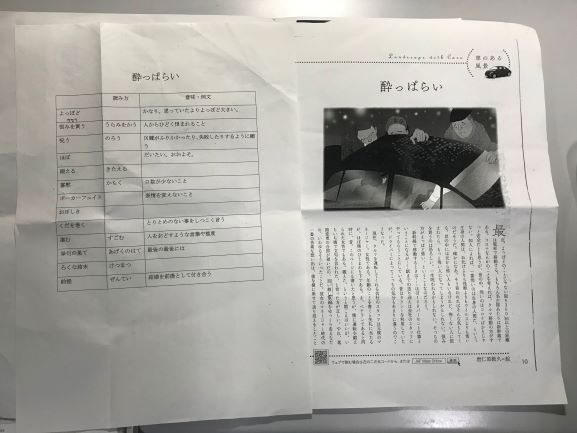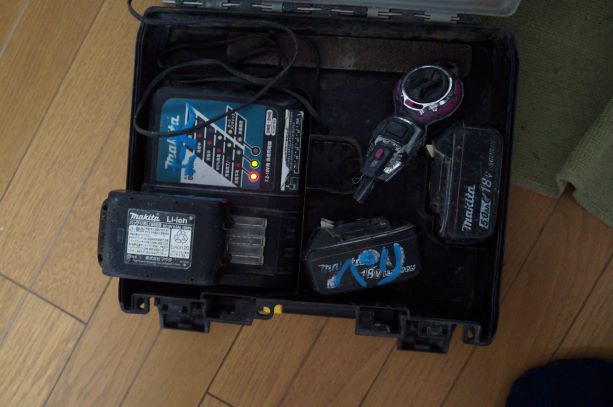現代ネパールにおけるサリーの多層性 ――ファッションとしてのサリー――
研究全体の概要 本研究の目的は、現代ネパールにおけるサリーの多層的な意味づけと、その意味を生成するサリーをめぐる実践の様相を明らかにすることである。地域ごとに多様な住民を「インド国民」として統合するインドのサリーとは異なり、近現代ネパール…

Photo 1: Reading materials in an advanced-level Japanese class which Gift attended
In Japan, a number of Thai migrant workers are employed through the Technical Intern Training Program (TITP). Most of them are employed in machinery, food processing, agriculture, construction, and other industries, in which Japanese enterprises are encountering labour shortages. Working and living in a different country to their own, how they negotiate their lives under different social and cultural conditions remains unclear.
This research aims to provide an ethnographic study of the Thai Technical Intern Trainees in Japan, particularly their working and living conditions as well as future plans after their completion of the training program.

Photo 2: The construction toolkits of a TITP worker in Miyagi prefecture
I conducted fieldwork in the prefectures of Aichi and Miyagi, interviewing two female and six male participants, respectively. In Aichi prefecture, I met Gift and Jan (pseudonyms), who worked in a metal pressing company. In general, they were satisfied with their working and living conditions. They could spend their spare time studying Japanese. Particularly, Gift attended an advanced-level Japanese class conducted by Japanese volunteers in her community. She explained that she wanted to master Japanese as much as possible in order to get other opportunities in Japan. And recently, Gift changed her residence status to ‘Specified Skilled Worker’ (SSW), a new visa programme for foreign workers in Japan, so she could remain in the country for at least five years longer. She also elaborated on the rationale for her decision to continue working in Japan. First, she determined that no one in Thailand was awaiting her return. She had already ended her relationship with her boyfriend after deciding to renew her TITP contract two years ago. Her parents had also divorced and begun their new lives. Gift asserted that she felt as though she no longer had roots in Thailand. Additionally, she had no interest in working in Thailand. So, she decided to extend her sojourn in order to explore new aspirations. The account of Gift exemplifies the decision making of migrants who continue to live in low socio-occupational status in Japan in order to pursue their aspirations.
On the contrary, her friend Jan intended to return to Thailand and start her own business. Jan mentioned that her job in Japan was not very difficult. Yet she felt that she was poorly paid. As a result, her private life in Japan was considerably constrained. She usually spent the majority of her time at work and in her room. She did not spend much time outside because doing so would incur substantial costs. Therefore, she decided to return to Thailand, where she found it easier to engage in many other activities of interest. Her narrative suggests that, despite the fact that TITP workers’ incomes in Japan are fairly high when translated to remittances or Thai currency, their financial conditions in Japan are quite constrained. Additionally, constrained social spaces, both physically and in terms of social circles, cause them distress.
The narratives of male workers in Miyagi prefecture differ slightly from Gift and Jan’s. As workers for a construction company, the majority of their tasks were physically demanding and necessitated additional commute time to their construction sites, which were dispersed. They described difficulties at their workplaces, such as the heaviness of their work materials, disputes with their Japanese supervisors, and tiredness from the early morning commute to their sites. However, as most of them have been working there for more than two years, they have learned to cope with the issues in their own ways and have mastered their jobs to the point that the company has asked them to stay for two more years. However, they all chose not to extend their stays. Some planned to return to Thailand to start their own businesses, while others planned to go to other destinations. For example, Oat wanted to continue his journey to Taiwan after returning to Thailand. According to a friend, whose father worked there and provided him with information, Taiwan may have lower wages than Japan, but the cost of living is lower. And above all else, it is not as tough as in Japan. In this sense, Thai migrants compare their direct migration experiences in Japan with information about their next destinations they are able to obtain through various channels, such as social media, internet sources, or their social networks. Regardless of the discrepancy between the information and the possible realities in those destinations, adverse conditions in Japan, whether in terms of economic returns, occupational hardships, or constrained life, become their subjective worse-off that they attempt to avoid while continuing to pursue their aspirations.
These narratives illustrate the interplay between the agency of migrants, both in terms of intention and power, and the structural forces that shape diverse migratory trajectories. While the migratory structure has given them temporary status, migrants are capable of looking for ways to extend their stay. In contrast, for those who find they do not wish to be suppressed by the current structure any longer, they just step out of it.
As a part of further study, I intend to identify the social and cultural capital that Thai TITP workers utilise for their identities and power negotiations while living in Japan and achieving their long-term goals.
Copyright © 附属次世代型アジア・アフリカ教育研究センター All Rights Reserved.